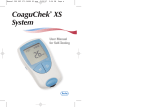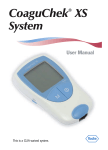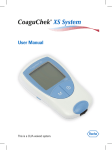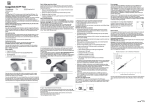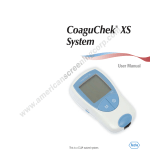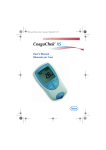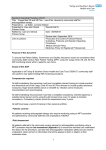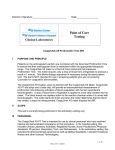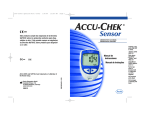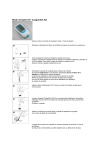Download CoaguChek® XS
Transcript
CoaguChek XS System ® User Manual for Self-Testing The contents of this manual, including all graphics and photographs, are the property of Roche Diagnostics. No part of this document may be reproduced or transmitted in any form or by any means, electronic or mechanical, for any purpose, without the express written permission of Roche Diagnostics. Roche Diagnostics has made every reasonable effort to ensure that all the information contained in this manual is correct at the time of printing. However, Roche Diagnostics reserves the right to make any changes necessary without notice as part of ongoing product development. This training manual was created by the Roche Diagnostics Technical Publications department. Direct questions or concerns regarding the contents of this document to: Roche Diagnostics Technical Publications Department 9115 Hague Road P.O. Box 50457 Indianapolis, IN 46250-0457 USA Aspects of the CoaguChek XS System (meter and test strips) and its use are covered by one or more of the following U.S. patents: 6,662,439; 7,073,246; 7,386,937; 7,407,811; 6,881,378; 6,207,000; 7,429,865; 6,645,368; 7,049,131; 7,084,251; 5,625,036. Additional U.S. patents pending. COAGUCHEK, ACCU-CHEK and SOFTCLIX are trademarks of Roche. All other trademarks are the property of their respective owners. © 2007-2009, Roche Diagnostics. US Order Number: 0 4999045001 (02) 2009-11 USA Distribution in USA by: Roche Diagnostics, Indianapolis, IN This document is available electronically at www.poc.roche.com. i Revisions to this document are provided by Roche Diagnostics when necessary. No part of this document may be reproduced in any form or by any means without prior written consent. Manual version Revision date Changes Version 2.0 November 2009 New document Table of Contents About this Manual...................................................................... 1 Symbols and Abbreviations.....................................................1 User Resources............................................................................ 2 Training DVD.................................................................................2 Getting Started..............................................................................2 User Manual..................................................................................2 Test Strip Package Inserts........................................................3 Lancet Device Package Inserts..............................................3 The CoaguChek XS System................................................... 4 Anticoagulation Medication.....................................................4 Blood-clotting Time.....................................................................4 How the System Works.............................................................5 The CoaguChek XS Meter........................................................6 Operating Conditions.................................................................7 Getting Started.............................................................................. 8 Batteries...........................................................................................8 Installing (or Replacing) Batteries.........................................9 Meter Setup................................................................................ 10 Setting the Date and Time.................................................... 11 The Meter’s Display................................................................. 14 Code Chip.................................................................................... 14 Inserting a New Code Chip................................................... 15 Integrated Quality Controls................................................... 16 Testing a Blood Sample.........................................................17 Tips for a Good Fingerstick................................................... 17 Important Notes About Blood Testing.............................. 18 Always....................................................................................... 18 Never......................................................................................... 18 Infection Control.................................................................... 19 Preparing for a Test................................................................. 20 Performing a Test...................................................................... 22 Very Low or Very High Test Results.................................. 27 Memory...........................................................................................28 Storing Test Results in Memory.......................................... 28 Reviewing Stored Test Results............................................ 28 Erasing Stored Test Results.................................................. 30 Cleaning/Disinfecting the Meter......................................32 Cleaning/Disinfecting the Exterior..................................... 33 Cleaning/Disinfecting the Test Strip Guide.................... 34 Error Messages...........................................................................37 Other Information......................................................................45 Product Limitations.................................................................. 45 Product Specifications............................................................ 45 Support/Services....................................................................... 46 Symbols......................................................................................... 47 Warranty.........................................................................................50 About this Manual Symbols and Abbreviations The test strip insert, the label on the back of the meter, the User Manual, and other packaging material may contain the following symbols or abbreviations: Use by Batch code/Lot number In vitro diagnostic medical device 0123 This product fulfills the requirements of the European Directive 98/79/EC for in vitro diagnostic medical devices Catalog number Consult instructions for use Caution (consult accompanying documents). Refer to safety-related notes in the manual accompanying this instrument. Manufacturer Temperature limitation (Store at) 1 User Resources Several resources are available to help you use and maintain the CoaguChek XS System. Training DVD The CoaguChek XS System DVD is for new users of the CoaguChek XS System. This program will help you get comfortable with the CoaguChek XS Meter and the testing procedure. Getting Started The Getting Started guide shows you how to perform your first coagulation test on the CoaguChek XS Meter. User Manual This CoaguChek XS System User Manual is a comprehensive guide to the meter and test strips. It is designed to provide answers to your questions about the meter’s operation and use. Read this entire manual carefully, and refer to it as necessary. 2 Test Strip Package Inserts Be sure to read the test strip package insert for important updates and keep the insert from your current test strip package for future reference. Lancet Device Package Inserts Be sure to read the lancet device package insert to learn how to use the lancet device and for important updates. Keep the insert from your current lancet device package for future reference. 3 The CoaguChek XS System The CoaguChek XS System measures blood-clotting time (Prothrombin Time) for people who are taking anticoagulation medications such as Coumadin® or warfarin. The CoaguChek XS System measures bloodclotting time using blood from the fingertip. Anticoagulation Medication Anticoagulation medications, also known as blood thinners, are prescribed to avoid unwanted clots. Your blood-clotting time must be monitored to ensure that your medication dosage is correct. Blood-clotting Time The rate at which blood clots is measured in units called INR. It is very important that you stay within your target INR range. If your INR is too low, the risk of blood clots increases. If your INR is too high, the risk for internal bleeding increases. Everyone’s INR is different. Your doctor determines the best INR range for you, depending on why you are taking anticoagulants and how you react to them. Your doctor also determines how often your blood should be tested. Your doctor needs to know your blood-clotting time in order to successfully treat you. 4 How the System Works The CoaguChek XS System includes a meter and CoaguChek XS PT test strips. Each box of test strips has its own code chip that you insert into the meter. The code chip contains important information about the test strips such as their expiration date and lot number. The CoaguChek XS System makes measuring bloodclotting time easy. The display on the meter guides you through the testing process. With the code chip inserted in the meter, you simply insert a test strip and apply a blood sample when the meter is ready. The meter displays the result in about a minute. The meter automatically stores the result in memory so that you can easily recall results. The CoaguChek XS PT test strip contains various ingredients. When a blood drop is applied, the meter starts the test and the blood mixes with the ingredients on the test strip. When the meter determines that the blood has clotted, it stops the measurement and calculates the result. 5 The CoaguChek XS Meter A Display B M (Memory) Button C ON-OFF Button D Test Strip Guide Cover E Test Strip Guide FBattery Compartment Cover G Code Chip Slot H SET Button I Data Port A F B G C D E H I 6 Operating Conditions To ensure that the CoaguChek XS Meter functions correctly, follow these guidelines: • Use the meter at room temperature, between 59°F and 90°F (15°C and 32°C). • Use the meter at a relative humidity of less than 85%, without condensation. • When testing, keep the meter level. • If you store the meter for a period of time, remove the batteries. • Do not use the meter at an altitude higher than 14,000 feet (4,300 meters). • Do not use the meter near a strong magnetic field, such as a microwave oven, as this may interfere with the meter’s proper operation. Note: The CoaguChek XS Meter automatically shuts off after 3 minutes if no buttons have been pushed. 7 Getting Started Refer to the Getting Started guide to learn how to set up the meter and prepare for and run your first bloodclotting time test. Batteries The CoaguChek XS Meter uses 4 AAA batteries. The recommended batteries, alkaline-manganese batteries, should last for approximately 60 tests. When you turn the meter on, the display briefly shows the battery symbol. The battery symbol is divided into 4 segments. With new, fresh batteries in the meter, the battery symbol shows all 4 segments. When only 1 segment appears, replace the batteries. When only 1 segment appears you can still access results stored in the meter’s memory. If you insert new batteries within 1 minute of removing the old batteries, the date and time settings will remain in memory. But if you do need to reset the date and time, refer to the Meter Setup section in this manual. The meter saves battery power by automatically turning off after 3 minutes, unless you press a button or insert a test strip. Even when the batteries are removed, the test results are saved in memory. 8 Installing (or Replacing) Batteries Have ready 4 AAA batteries. 1. Open Battery Compartment With the meter turned off, turn it over. Press the latch gently inward and lift the cover. Remove the old batteries, if necessary. 2. Insert New Batteries Position the batteries according to the diagram inside the battery compartment. Replace the cover. Turn the meter back over. Whenever you put batteries in the meter, it automatically goes to Setup mode. 9 3. Turn Off Turn the meter off . Meter Setup The CoaguChek XS Meter is preset with the U.S. date format (month-day-year) and U.S. time format (12-hour as opposed to 24-hour). Before you use the meter for the first time—or if there is no battery power for more than 1 minute—you’ll have to set the current date and time. 10 Setting the Date and Time The date and time settings are important. Each time you run a test, the meter compares its date with the test strip’s expiration date. If the test strips are expired, the meter displays an error message and prevents you from running a test. Whenever you put batteries in the meter, it automatically goes to Setup mode (where you set the date and time). You can also go to Setup mode at any time by pressing the SET button ( ). To set the date and time, you’ll use these buttons: • to change a setting. • (SET) to accept a setting. 11 1. Go to Setup Mode If the meter is not already in Setup mode, press the SET button . The date format flashes in the upper-right corner. 2. Set Today’s Date 12 Press the SET button Press the M button to change the year. Press the SET button Press the M button change the month. Press the SET button Press the M button change the day. Press the SET button . . to . to . 3. Set Current Time Press the SET button . Press the M button to change the hour. Press the SET button . Press the M button to change the minutes. Press the SET button . 4. Turn Off Turn the meter off . If, in the future, you need to change the date and time, press the SET button to re-enter Setup mode. After you change the date and time, just turn the meter off . Other set-up choices in the meter must be set or changed by your doctor. 13 The Meter’s Display When you turn the meter on, it briefly shows all the display’s letters, numbers, and symbols. Regularly check that all segments of each letter, number, and symbol appear. Please compare your meter’s display to the meter display shown here on this page. You can display all the letters, numbers, and symbols for a longer time to allow comparison. To do this, turn the meter on and then hold down the ON-OFF button . The full display should appear as shown at left. Code Chip 14 Each box of test strips comes with its own code chip. The code chip provides the meter with information such as the lot number and expiration date of the test strips. Before each test, make sure the correct code chip is in the meter. Each time you open a new box of test strips, replace the old code chip with the new one. Protect the code chip from moisture and also from equipment that produces magnetic fields, such as a microwave oven. Inserting a New Code Chip Have the correct code chip ready. With the meter turned off, 1. Remove Old Code Chip remove the old code chip and throw it away. 2. Match Code Numbers Make sure that the 3-digit code number on the new test strip container matches the 3-digit code number on the new code chip. 3. Insert New Code Chip Slide the new code chip into the code chip slot until it snaps into place. 15 Integrated Quality Controls The CoaguChek XS System has built-in quality control functions in the meter and test strips. The meter automatically runs its own quality control test as part of every blood test, so you never have to run quality control tests with liquid quality controls. When the quality control test runs, the letters QC flash on the meter’s display. When the quality control test is finished, a checkmark (3) appears following the letters QC. Then the meter continues to run the blood test. If the quality control test fails, the meter displays this error message. See the Error Messages section in this manual for an explanation of this and other error messages and what to do when they occur. 16 Testing a Blood Sample Tips for a Good Fingerstick For fingerstick blood testing, increasing the blood flow in your finger will help you get a good drop of blood. Before you stick your finger, try the following techniques until you see that your fingertip has good color: • Warm your hand by holding it under your arm, use a hand warmer, and/or wash your hand with warm water. • Hold your arm down by your side, so that your hand is below your waist. • Massage your finger from its base. If needed, immediately after pricking, gently squeeze your finger from the base to encourage blood to flow. 17 Important Notes About Blood Testing Always • Operate the meter at temperatures between 59°F and 90°F (15°C and 32°C). • Refer to the test strip package insert for proper use and handling of test strips. • Keep the test strip guide and meter clean. See Cleaning the Meter section in this manual for more information. Never • Store the meter in extreme temperatures below 59°F or above 90°F (below 15°C or above 32°C). • Store the meter in damp or humid conditions (greater than 85% humidity). • Remove or insert the code chip while the meter is performing a test. • Use a code chip from a box of test strips other than the one in use. • Touch or remove the test strip during a test. • Wait more than 15 seconds after sticking your fingertip before applying the blood. 18 • Add more blood after the test has begun. • Touch any buttons while a test is in progress. • Perform a test with a drop of blood from a previous fingerstick. Infection Control The ACCU-CHEK® Softclix lancet device is intended for use by a single person and is not suitable for use where testing different persons with the same device may lead to infections. 19 Preparing for a Test 1. Gather Items Gather the following items: • CoaguChek XS Meter • Container of test strips • Test strip code chip • ACCU-CHEK Softclix lancet device and lancet Each box of test strips comes with a matching code chip. Every time you open a new box of test strips, you must replace the code chip. 2. Match Code Numbers 20 Make sure the 3-digit code number on the test strip container and the code chip match. 3. Insert Code Chip Make sure the meter is turned off. With the code number facing up, insert the code chip into the code chip slot until it snaps into place. 4. Prepare Lancet Device Pull off the cap of the lancet device. Insert a new lancet. Twist off the lancet’s protective cap. Put the cap back on the lancet device. Line up the notches for the cap to fit. Select the penetration depth. Press the plunger. A yellow dot appears in the release button. 5. Wash Hands Wash your hands in warm, soapy water. Make sure your fingertip is thoroughly dry. 21 Performing a Test 1. Get Ready Take a test strip out of the container. Close the container tightly. You have 10 minutes to use a test strip once you remove it from the container. 2. Insert Strip Slide the test strip into the test strip guide in the direction of the arrows until it stops. The meter turns on. The code number of the inserted code chip flashes on the display. 22 3. Match the Code Numbers Confirm that the number displayed matches the number on the test strip container, then press the M button . If the numbers are different, make sure you are using the code chip that came with the test strips you are using. An hourglass appears as the meter warms up, which takes about 30 seconds When the meter is warmed up a flashing test strip appears and the meter begins a countdown. You have 180 seconds to apply blood to the test strip. 23 4. Collect the Blood Massage your finger until you see increased color in your fingertip. Keeping your hand down, press the tip of the lancet firmly against the side of your fingertip. Press the release button. Gently squeeze from the base of your finger to develop a hanging drop of blood. 5. Identify the Target Area 24 Find the target area on the test strip. To prevent error messages, the meter must be on a table free of vibrations. 6. Apply the Blood Within 15 seconds of sticking your fingertip, apply the blood to the target area of the test strip—from the side of the test strip. Hold the blood drop to the test strip until you hear a beep. The flashing blood drop symbol disappears. Do not add more blood to the test strip. Do not touch the test strip. The result appears in about 1 minute. 25 7. Record Result Record the result on the CoaguChek XS System Prothrombin Time SelfTesting Log Book. Call your doctor with the test result. 8. Clean Up Remove the lancet from the lancet device. Place the used test strip and lancet in a punctureproof container with a lid. Turn the meter off . If the meter is dirty, wipe it clean with a lint-free tissue and an approved cleaning solution. See Cleaning the Meter section of this manual. 26 Very Low or Very High Test Results The CoaguChek XS PT test strips provide test results if the INR value is between 0.8 and 8.0. If the meter displays < (less than) 0.8 or > (greater than) 8.0, repeat the test. If, when you repeat the test, you get the same result (either < 0.8 or > 8.0), call the Roche Diagnostics Technical Service Center at 1-800-428-4674. OR If you see “error 7,” this means the meter was unable to detect a clot. Repeat the test. Be sure to carefully follow the steps on the previous pages. For example, make sure the fingertip is thoroughly dry, use the meter on a surface free of vibrations, and apply the blood drop within 15 seconds of sticking the fingertip. If you still get “error 7,” call your doctor immediately to arrange for testing using another method. 27 Memory Storing Test Results in Memory The CoaguChek XS Meter automatically stores up to 100 test results and their dates and times in its memory. If the memory is full when you perform a test, the oldest result is automatically deleted. The most recent result is always saved. Note: All test results remain in memory even when the meter is without batteries. Reviewing Stored Test Results You can review stored test results even when the meter’s battery power is low. To review results in memory: 1. Access the Memory 28 Press the M button . The meter turns on, if it is not already on, and goes to Memory mode. 2. View Most Recent Result The most recent test result appears. The letters mem indicate that you are viewing a result in memory. The time and date of the test also appear. If there are no results in memory, a 0 appears in the display’s top-right corner. 3. View Earlier Results To view earlier results, press the M button again. After you have viewed all the results in the memory, 3 dashes appear. 29 Erasing Stored Test Results You can erase all of the test results that are stored in the meter’s memory. You cannot, however, erase individual test results. To erase all stored results: 1. Go to Erase mode. With the meter turned off, press and hold down the M button . While you are holding down the M button, press the ON-OFF button and then hold down both buttons for at least 5 seconds. The meter displays mem (flashing) and clr. The number of results in memory is shown in the top-right corner of the display. 30 2. Confirm to Press the M button confirm that you want to erase the entire memory. The hourglass symbol flashes while the test results are being erased. Then, the counter is set to 0 and 3 dashes appear. Note: To exit Erase mode without erasing the results, press the ON-OFF button instead. 31 Cleaning/Disinfecting the Meter Please follow the procedures below to clean the meter. Failure to follow these procedures may cause malfunction of the meter. • Clean the meter only when contaminated with blood. • Do not use sprays of any sort. • Ensure that swab or cloth is only damp, not wet. Useful tip: To prevent contamination, apply blood via side-dosing directly from fingertip. 32 Cleaning/Disinfecting the Exterior • Use 10% bleach solution (1 part bleach and 9 parts water) or 70% isopropyl alcohol (rubbing alcohol) to clean and disinfect the meter housing (the exterior of the meter). • E nsure that the blue test strip guide cover remains tightly closed while cleaning the housing. 1. Clean/Disinfect the Exterior With the meter turned off, wipe the meter’s exterior clean. • Do not let liquid accumulate near any opening. Make sure that no liquid enters the meter. 2. Dry the Exterior • With a lint-free tissue, wipe away residual moisture and fluids after cleaning the housing. • Allow wiped areas to dry for at least 10 minutes before performing a test. 33 Cleaning/Disinfecting the Test Strip Guide • Use 10% bleach solution (1 part bleach and 9 parts water) or 70% isopropyl alcohol (rubbing alcohol) to clean the test strip guide. 1. Open the Cover 34 With the meter turned off, use your thumbnail to open the cover of the test strip guide by pressing its front edge upward. 2. Clean/Disinfect the Test Strip Guide • Hold the meter upright with the test strip guide facing down. • Clean the easily accessible areas with a cotton swab. • Be sure the swab is only damp, not soaking wet, to ensure excess fluid does not enter the meter. • Wipe away residual moisture and fluids. Caution: Do not insert any objects into the test strip guide. Doing so could damage the electrical contacts behind the test strip guide. 35 36 3. Allow to Dry With the cover off, allow the test strip guide to dry for at least 10 minutes before re-attaching the test strip guide cover and testing again. 4. Close the Cover Close the cover, and make sure it snaps into place. Error Messages You may see the following error messages while using the CoaguChek XS Meter. If you see an error message, first try to correct the problem using the solution described below. If the problem persists, call the Roche Diagnostics Technical Service Center at 1-800-428-4674. Error: Test Strip Possible causes: • A test strip was already inserted when the meter was turned on. • The meter timed out after you inserted the test strip. • The test strip is unusable. • The test strip is not a CoaguChek XS PT test strip. Solution: Remove the test strip. Then repeat the test with a new CoaguChek XS PT test strip. 37 38 Error: Meter Temperature The meter is too cold or too warm to measure correctly. Solution: Turn the meter off and allow it to stand for about 30 minutes at room temperature between 59°F and 90°F (15°C and 32°C). Error: Battery The battery level is too low. Solution: Replace the batteries. See the Batteries section of this manual. Error: Test Strip Guide Cover The test strip guide cover is not properly closed. Solution: Close the test strip guide cover. Error: Code Chip The code chip is missing, not properly inserted, or damaged. Solution: Check to see if you have the correct code chip properly inserted into the meter. For more information, see the Code Chip section of this manual. If the code chip is damaged, call the Roche Diagnostics Technical Service Center at 1-800-428-4674. 39 Error: Test Strip Expired Solution: The test strip has expired. Check the meter’s date setting. If it is not correct, set the correct date. For more information, see the Meter Setup section of this manual. If the date is correct, turn the meter off and remove the code chip and the test strip. Then use the code chip and a test strip from a new box of test strips. Error: Test Strip Unusable The test strip is unusable. 40 Solution: Turn the meter off, remove the test strip, and then re-insert it. If the error message reappears, discard the unusable test strip and use a new one. Error: Time Exceeded You did not apply blood to the test strip within 180 seconds after the blood drop symbol appeared. Solution: Turn the meter off and remove the test strip. Repeat the test using a new test strip and blood taken from a new fingerstick from a different finger. Error: Blood Application Error applying blood to the test strip. Solution: Turn the meter off and remove the test strip. Repeat the test using a new test strip and blood taken from a new fingerstick from a different finger. 41 42 Error: Test Strip Interference The test strip was touched or removed during the test. Solution: Turn the meter off and remove the test strip. Repeat the test using a new test strip and blood taken from a new fingerstick from a different finger. Do not touch or remove the test strip when a test is in progress. Error: Quality Control Failure The test strip failed the internal quality control check. The test strip is unusable. Solution: Turn the meter off and remove the test strip. Repeat the test using a new test strip and blood taken from a new fingerstick from a different finger. Error: Measurement Error Measurement error caused by the blood sample. Solution: If you see “error 7,” this means the meter was unable to detect a clot. Repeat the test. Be sure to carefully follow the steps on the previous pages. For example, make sure the fingertip is thoroughly dry, use the meter on a surface free of vibrations, and apply the blood drop within 15 seconds of sticking the fingertip. If you still get “error 7,” call your doctor immediately to arrange for testing using another method. 43 Error: Internal Error An error occurred during the internal diagnostic test. Error: Internal Error 44 Solution: Turn the meter off and remove the batteries. Wait at least 1 minute before re-inserting the batteries into the battery compartment. Re-set the date and time as described in the Meter Setup section of this manual. Caution: The date and time must be set correctly. Repeat the test. If you see the same error message again, the meter has a defect. Call the Roche Diagnostics Technical Service Center at 1-800-4284674. Solution: Because this error indicates possible damage to the heater plate contacts, call the Roche Diagnostics Technical Service Center at 1-800-428-4674 to have the meter replaced. Other Information Product Limitations Please read the information packaged with the test strips regarding up-to-date product specifications and limitations. Product Specifications Operating Conditions Temperature +59°F to +90°F (+15°C to +32°C) Relative humidity Less than 85% (without condensation) Maximum altitude 14,000 feet (4300 m) Placement Operate the meter on a level, vibration-free surface or hold it so it is roughly horizontal. Measuring range Refer to the test strip package insert. Memory 100 test results with date and time Interface Infrared interface, LED/IRED Class 1 Battery operation 4 AAA batteries Number of tests per set of batteries Approx. 60 tests Safety class III Automatic power-off After 3 minutes Dimensions 5.43 x 3.07 x 1.10 in (138 x 78 x 28 mm) Weight 4.48 oz. or 127 g (without batteries) 45 Sample Material Sample type Capillary whole blood or non-anticoagulated venous whole blood. Sample size At least 8 µL Interference Refer to the test strip package insert. Non-Operating Storage and Transport Conditions Temperature range -13°F to +158°F (-25°C to +70°C) Relative humidity 10% to 85% (without condensation) Support/Services Questions Please call the Roche Diagnostics Technical Service Center at 1-800-428-4674 if you have questions regarding the handling of your meter, the reliability of your results, or if you suspect the meter is defective. Repairs Please note that repairs, new settings or other modifications to the meter may only be performed by persons authorized by Roche Diagnostics. 46 Symbols The following table lists all of the display screen icons and their meaning. Symbol Meaning Test strip (without sample application area) Test strip (with sample application area) Apply sample User must wait until the meter has completed an action. 24-hour time format 12-hour time format Time between midnight and noon (in 12-hour time format) Time between noon and midnight (in 12-hour time format) Indicates the results are displayed as a Quick percentage value. Indicates the results are displayed in Seconds. Indicates the results are displayed in INR units. 47 Symbol Meaning Beep tone is turned on Beep tone is turned off Result is above the chosen therapeutic range (only with INR as unit) Result is below the chosen therapeutic range (only with INR as unit) • Results in the chosen unit • Error numbers Memory contains no results or no further results Displays the time in HH:MM format Displays the date in DD-MM-YY, MM-DD-YY or YY-MM-DD format. The monitor is in Setup Mode. Indicates the code number of the code chip inserted in the meter. Result in the chosen unit is above the measuring range. Result in the chosen unit is below the measuring range. 48 Symbol Meaning Battery status: • When the batteries still have their full charge, all segments are lit. • Individual segments disappear one by one as the batteries become weaker. • When there is no segment remaining, you can no longer perform a test. You can, however, still access the meter’s memory. The meter is in Memory Mode. Automatic quality control completed successfully Reports an error (see Error messages) Room or meter temperature is outside the acceptable range. Communication is taking place via the infrared interface Measurement chamber cover is open. 49 Warranty CoaguChek XS Meter Limited (2 Year) Warranty ROCHE DIAGNOSTICS warrants, to the original purchaser only, that the meter shall be free from all defects in material and workmanship for a period of two years from the date of purchase. Purchaser’s sole and exclusive remedy, with respect to the CoaguChek XS meter and parts thereof, shall be the repair and/or replacement of the meter or parts at the option of Roche Diagnostics. THE ABOVE WARRANTY IS EXCLUSIVE OF ALL OTHER WARRANTIES, AND ROCHE DIAGNOSTICS MAKES NO OTHER WARRANTIES, EXPRESS OR IMPLIED, INCLUDING WITHOUT LIMITATION THE IMPLIED WARRANTY OF MERCHANTABILITY OR FITNESS FOR A PARTICULAR PURPOSE. IN NO EVENT SHALL ROCHE DIAGNOSTICS BE LIABLE TO THE PURCHASER OR ANY OTHER PERSON FOR ANY INCIDENTAL, CONSEQUENTIAL, INDIRECT, SPECIAL OR PUNITIVE DAMAGES ARISING FROM OR IN ANY WAY CONNECTED WITH THE PURCHASE OR USE OF THE METER. NO WARRANTY OF MERCHANTABILITY OR FITNESS FOR A PARTICULAR PURPOSE, IF ANY IS IMPLIED FROM THE SALE OF THE COAGUCHEK XS METER. NO WARRANTY, EXPRESS OR IMPLIED (IF ANY), SHALL EXTEND FOR A LONGER DURATION THAN THE DURATION OF THE EXPRESS WARRANTY STATED ABOVE. 50 The foregoing warranty shall not apply to a meter which is damaged by accident or subject to alteration, misuse, tampering, and/or abuse, including the use of Dispatch® products. Meters which show damage or misuse will be handled in accordance with the non-warranty service policy of Roche Diagnostics. The warranty of the repaired/replacement meter will expire on the date of the original warranty expiration or ninety (90) days after shipment of a replacement system, whichever period is longer. 51 52 0123 ACCU-CHEK, COAGUCHEK and SOFTCLIX are trademarks of Roche. Manufactured for and distributed in the U.S.A. by: Roche Diagnostics 9115 Hague Road Indianapolis, IN 46256 Roche Diagnostics GmbH Sandhofer Strasse 116 68305 Mannheim Germany www.roche.com www.poc.roche.com 0 4999045001 (02) 2009-11 USA




























































